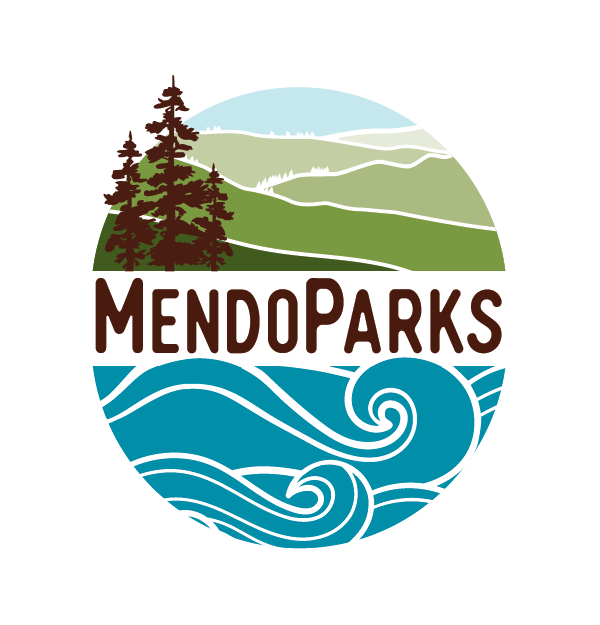It's harbor seal pupping season!
Harbor seal mother and pup at MacKerricher State Park: Ron LeValley
Want to join the fun?
Here are some tips from California State Parks Interpreter Katherine Gabrielson for safely viewing the pups.
MacKerricher State Park is home to a harbor seal rookery, and mid-April through mid-May is the prime time to safely view these special creatures. If you plan to visit, please keep the following pointers in mind.
Please stay quiet around the rookery
Loud noises can disturb and scare mother harbor seals away from their pups. We are, after all, visiting their "home" and we need to be respectful with our voices!
No dogs in or near the rookery
Dogs look like a predator (no matter the size of dog) and can cause seals to flee or defend themselves! Dogs and seals can also share disease so for the health of your dog and the seals, please do not let your dog approach or interact with any seals.
Do not approach any seals
Humans are very scary to a harbor seal! We are big, loud, and move quickly. When harbor seals see a human get too close the seals may "flush" (go back into the water). This can be extremely harmful to harbor seals and their pups because these animals need time on land to rest, warm up, or to evade a marine predator (sharks/orcas).
During pupping season, if a mother harbor seal sees a human (what she will perceive to be a predator) approach her pup, she may leave and not come back for her pup. That pup is then left alone without a food source or any protection from predators.
Do not approach any harbor seal pups, even if you believe the pup looks abandoned. It is important to know that not every pup alone on the beach is an abandoned pup.
Mother harbor seals will leave their young on the beach to go hunting. Though you may not see the mother, she is always watching her pup while hunting. Approaching a lone pup on the beach could lead to abandonment. If you believe the pup has been abandoned call the Marine Mammal Center.
Please report marine mammals that appear to be ill, abandoned or in danger to The Marine Mammal Center at (415) 289-7325.
Harbor seal rookery: Becky Bowen
You may wonder...
"How can I get a good view/picture?"
The best way to view harbor seals is from a cliff overlooking the rookery. While sitting quietly you'll be able to watch the seals come and go. A happy, relaxed seal is a photogenic seal! You can use binoculars or the zoom on your phone for a great close up view or picture.
“That pup looks abandoned!”
Pups are often left alone on the rocks or on the beach so the pup's mother can go out and hunt. Though you may not see the mother- she can probably see you! She will keep a close eye on her pup to make sure it is safe, so approaching a lone pup on the beach may lead to the mother believing that the pup was taken by a predator and she may not return.
If you notice that a pup has been alone for a long time, looks thin, or looks sick then it's time to act! Use your cell phone to call the Marine Mammal Center to report a potentially abandoned pup. They will ask for photos of the animal and your location so they can let their volunteers know exactly where to go and what to expect!
Our best way to serve and protect these animals is by contacting experts when we think something is wrong.
"Can I feed the seals?"
Nope! These are wild animals that need to hunt for themselves. When humans feed wild animals, we can accidentally make them sick or teach these animals that they should approach populated areas in search of more humans to feed them.
"So how can I help the seals?"
The best way to help harbor seals, especially during pupping season, is to:
Keep your distance
Respect their home by staying quiet and not littering
Call an expert (The Marine Mammal Center) if you see a sick, injured, or abandoned pup
These amazing animals have all the adaptations that they need to survive, so we can sit back, relax, and observe these wild animals in their natural habitat!
Please report marine mammals that appear to be ill, abandoned or in danger to The Marine Mammal Center at (415) 289-7325.
You’ll help The Marine Mammal Center provide a humane response to these animals by giving them a second chance while helping researchers with their ongoing studies.
Please report all dead marine mammals to the Noyo Center at 707-733-NOYO
Thank You to our Park Angels
Little River Inn Beachcomber Motel Surf & Sand Lodge
The Beach House Inn Harvest Market Out of this World
Stanford Inn Liquid Fusion Kayaking Mendocino Realty Company
Corners of the Mouth Roederer Estate Flow Restaurant
Mendocino Cafe Braggadoon Signs and Graphics Cris Qualiana Art
Thank you to all of our members, volunteers and donors.
We couldn't do this without your support! Thank you!


